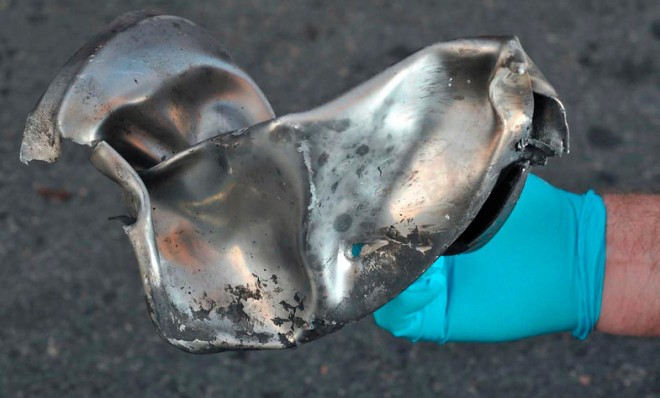Why the Boston Marathon bombs are considered 'weapons of mass destruction'
Nukes, pressure cookers, and everything in between are WMDs, according to the government


On Monday, the federal government charged suspected Boston Marathon bomber Dzhokhar Tsarnaev with "unlawfully using and conspiring to use a weapon of mass destruction."
Say what?
For most, the term WMD suggests complex nuclear or chemical weaponry, the sort of devastating arsenal Saddam Hussein supposedly had prior to the U.S-led invasion of Iraq. The biggest weapons Tsarnaev and his brother are accused of using? Pressure cookers full of sharp metal objects.
The Week
Escape your echo chamber. Get the facts behind the news, plus analysis from multiple perspectives.

Sign up for The Week's Free Newsletters
From our morning news briefing to a weekly Good News Newsletter, get the best of The Week delivered directly to your inbox.
From our morning news briefing to a weekly Good News Newsletter, get the best of The Week delivered directly to your inbox.
So how does a souped-up kitchen appliance get roped in with weapons that can cross continents and obliterate entire cities? The answer is the government's very loose definition of what constitutes a WMD.
By law, a WMD can be "any explosive, incendiary, or poison gas," including bombs, grenades, and mines, regardless of their blast potential. Missiles and rocket-propelled explosives also qualify, so long as they meet minimal requirements on the size of their charges.
By that definition, virtually any improvised explosive can be classified as a WMD, which "speak[s] to the definitional absurdity" surrounding those weapons, says Wired's Spencer Ackerman.
"About all that doesn't apply are firearms and pyrotechnics gear," he says. "No one ever said the law had to coincide with military terminology."
A free daily email with the biggest news stories of the day – and the best features from TheWeek.com
So how did we get to the point where firecrackers, if used toward evil ends, could possibly be classified as WMDs?
As Foreign Policy's Timothy Noah notes, the U.S. first used the term "weapons of mass destruction" in the 1940s to describe nuclear warheads. A few years later, the United Nations expanded that definition to include chemical and biological weapons, diluting the term's meaning. That erosion continued over the years such that Tsarnaev's case now "renders entirely meaningless a phrase that was already too crudely propagandistic to warrant much respect," says Noah.
Give me a break. Even granting that the language of the law is not the same as the language of everyday speech, it's ridiculous to call the bombs that went off in Boston "weapons of mass destruction." If any old bomb can be called a WMD, then Saddam most definitely had WMDs before the United States invaded Iraq 10 years ago. And if an IED is a WMD, then Iraq actually ended up with more WMDs after the U.S. invasion than before (and isn't entirely rid of them yet). [Foreign Policy]
But ridiculous or not, the charges against Tsarnaev, which carry a maximum penalty of death or life in prison, fit the letter of the law.
Jon Terbush is an associate editor at TheWeek.com covering politics, sports, and other things he finds interesting. He has previously written for Talking Points Memo, Raw Story, and Business Insider.
-
 Claude Code: the viral AI coding app making a splash in tech
Claude Code: the viral AI coding app making a splash in techThe Explainer Engineers and non-coders alike are helping the app go viral
-
 ‘Human trafficking isn’t something that happens “somewhere else”’
‘Human trafficking isn’t something that happens “somewhere else”’Instant Opinion Opinion, comment and editorials of the day
-
 What would a credit card rate cap mean for you?
What would a credit card rate cap mean for you?the explainer President Donald Trump has floated the possibility of a one-year rate cap
-
 The billionaires’ wealth tax: a catastrophe for California?
The billionaires’ wealth tax: a catastrophe for California?Talking Point Peter Thiel and Larry Page preparing to change state residency
-
 Bari Weiss’ ‘60 Minutes’ scandal is about more than one report
Bari Weiss’ ‘60 Minutes’ scandal is about more than one reportIN THE SPOTLIGHT By blocking an approved segment on a controversial prison holding US deportees in El Salvador, the editor-in-chief of CBS News has become the main story
-
 Has Zohran Mamdani shown the Democrats how to win again?
Has Zohran Mamdani shown the Democrats how to win again?Today’s Big Question New York City mayoral election touted as victory for left-wing populists but moderate centrist wins elsewhere present more complex path for Democratic Party
-
 Millions turn out for anti-Trump ‘No Kings’ rallies
Millions turn out for anti-Trump ‘No Kings’ ralliesSpeed Read An estimated 7 million people participated, 2 million more than at the first ‘No Kings’ protest in June
-
 Ghislaine Maxwell: angling for a Trump pardon
Ghislaine Maxwell: angling for a Trump pardonTalking Point Convicted sex trafficker's testimony could shed new light on president's links to Jeffrey Epstein
-
 The last words and final moments of 40 presidents
The last words and final moments of 40 presidentsThe Explainer Some are eloquent quotes worthy of the holders of the highest office in the nation, and others... aren't
-
 The JFK files: the truth at last?
The JFK files: the truth at last?In The Spotlight More than 64,000 previously classified documents relating the 1963 assassination of John F. Kennedy have been released by the Trump administration
-
 'Seriously, not literally': how should the world take Donald Trump?
'Seriously, not literally': how should the world take Donald Trump?Today's big question White House rhetoric and reality look likely to become increasingly blurred
